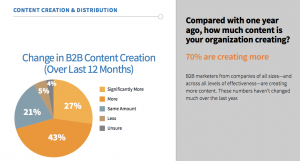Everything in marketing and sales is about “the algorithm.” Each of us is a critical part of algorithm’s–actually we are probably critical parts of hundreds to thousands of algorithms, since each is optimized for different purposes.
There are algorithms that track our online behaviors, theoretically to present content that is more aligned to interests derived from our behaviors. The theory is to make it easier to find things the algorithms think we might be interested in.
Since the algorithms, are designed an implemented by people other than ourselves, the reality is they better serve the designers’ interests than ours. That is, the designer may have biases about how they’d like to guide us through their sites or platforms.
This is not a new occurrence. Over 20 years ago, I was curious about the customer service mechanisms of a company. They were the benchmark of outstanding customer service. I was a CRO of a large technology company and wanted to get more insight for what they were doing and how they were so effective. We conducted a test, my team was using this company’s tools. Every time I called in on an issue, I would have my VP of Technical Services call in with the same issue. When he had an issue, I would call in with the same issue.
We found we were handled very differently. He was very technically knowledgeable and an expert with these types of tools. And I….. well I still struggle to walk and chew gum at the same time. This company recognized the differences. The people that answered the question from my VP of Technical Services complemented his technical capabilities and curiosity very well. The people responding to my similar question were very patient, used short sentences and single syllable words. You can imagine the conversation went, “See Dave log-on. Log-on Dave, Log-on…..Wow Dave, that’s great, let’s go the next step…”
That use of data about each of us and how to best help and support us was very powerful and created an outstanding experience.
So algorithms are important and very critical in creating great customer experience.
At the same time, algorithms can be very destructive, either accidentally or maliciously. The news is filled with all sorts of nightmare stories of malicious use of algorithms to misinform, misdirect, manipulate us, or worse.
Hopefully, the majority of times this is not malicious, but an unintended consequence. For example, one of the major problems most algorithms have is reinforcing confirmation bias. As we search for certain things, the algorithms tend to feed us things that support what we are searching for. We like certain content, so we are directed to similar content, with similar points of view.
The problem is, often, the most useful content might be things that challenge our thinking or present us differing points of view.
There’s another problem with algorithms. Often, it’s less the problem of the developer of algorithms and more the problem of others exploiting the algorithm and gaming it.
For example, early in Clubhouse’s launch I found the platform powerful and interesting. As people flocked to the platform, they started understanding the algorithms, and gaming them. As a result, the platform has become useless to me. I can’t find the content I want, I am inundated with messages from people who have gamed the algorithms in ways that serve their purposes but that have driven me off the platform.
We’ve seen the same thing with virtually every other social platform. Facebook’s challenges are well known. LinkedIn is less useful to me today then is was 18 months ago. And 18 months ago, it was less useful to me than it was 4 years ago.
It’s not because of the platform itself, though LinkedIn has changed many of it’s policies to make it easier to game the algorithms. But it’s how people who want to exploit the platform leverage the algorithm.
It used to be, I rarely received spam in LinkedIn. Now 100% of the InMails I get are spam and 65% of the invitations I get are spam– or even not real people. Several years ago, I was amused getting an invitation to connect with “Dave Brock.” This individual looked just like me and had my exact profile. He was my twin, my clone!
I’ve been engaged in a discussion with a follower about leveraging endorsements and recommendations to improve my “SEO” within LinkedIn. The discussion is interesting but bothers me. For example, in my profile I have 1000’s of endorsements. 90% of those, I don’t believe I deserve. They are from people with whom I have had little or no engagement, they are in areas that have little to do with my real competencies. But they feed the algorithm–improving both my SEO and that of the endorsers.
As a result, the value of endorsements has become “0.” They have no meaning, they are only manipulations of the algorithm.
We see this in LinkedIn content. A year ago, a writing style known as “bro-etry” was highest ranked by the algorithms. Today, it seems that surveys are the highest ranked. So one sees surveys about whether surveys are useful or not having high rankings.
Algorithms have been and will continue to be an increasing part of our lives. They can be useful and they can be destructive, and more often, they are just plain annoying.
As we get annoyed with certain platforms because of how the algorithms are being gamed–destroying the value of the platforms for all except those who revel in gaming each other; there will be new platforms developed. Those, in turn will lose their value because of how they become gamed, and we move to the next and the next and so on……
And perhaps, the people who coined the term Artificial Intelligence knew what they were talking about. Most of us focused on the intelligence aspect of the term. Instead, what we may be seeing is a greater emphasis on the Artificial aspect of the term.
Sorry for the long rant—it’s been a bad few days on social media.
Digital & Social Articles on Business 2 Community(34)
Report Post






